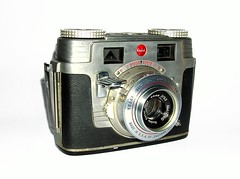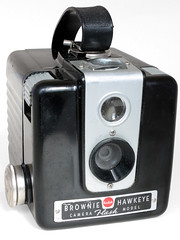Difference between revisions of "Arthur H Crapsey"
m (image, link) |
m (→Sources: link correction) |
||
| Line 56: | Line 56: | ||
* London, Ralph and Rick Soloway, ''"[http://www.ricksoloway.com/PhotoCanV32-3PROOF_1.pdf Camera Designs of Walter Dorwin Teague]"'', Photographic Canadiana, Dec 2006, Toronto, Canada. | * London, Ralph and Rick Soloway, ''"[http://www.ricksoloway.com/PhotoCanV32-3PROOF_1.pdf Camera Designs of Walter Dorwin Teague]"'', Photographic Canadiana, Dec 2006, Toronto, Canada. | ||
* [http://www.freepatentsonline.com Free Patents Online] | * [http://www.freepatentsonline.com Free Patents Online] | ||
| − | * [http:// | + | * [http://www.idsa.org/content/content1/arthur-hunt-crapsey-jr-fidsa Crapsey Profile] on [http://www.idsa.org/ Industrial Designers Society of America] |
=== Links === | === Links === | ||
Revision as of 21:08, 3 February 2011
Arthur Hunt Crapsey, Jr (1919-1998) was an influential camera designer working for Eastman Kodak, who had a hand in a great many designs. After graduating in Ceramic Design, he served in the US Air Force during World War II. Invalided out after losing his legs, he became one of Kodak's first industrial designers in 1945. Between 1948 and 1958 Crapsey was credited with patents for a large number of cameras, including:
Crapsey was also granted patents for parts of cameras, over a long period (e.g. strap attaching device, US no. 2,521,903 (12 Sep 1950); a film cartridge, US no. 3,617,013 (2 Nov 1971) and Folded Path Zoom Lens US Patent US3658411 (25 Apr 1972)) and his patents are referenced by many later patentees (e.g. for the Lomo Dalek/Supersampler, US Patent D476674 -1 Jul 2003).
Crapsey is acknowledged as the main designer of the Kodak Brownie Star series and the Instamatic M-6 cine camera (1965). Crapsey became manager of the Eastman Kodak design group in 1960 - possibly the reason his name was on so many later patent applications. He had possibly been inspired in some designs by Walter Dorwin Teague.
Sources
- Soloway, Rick and Ralph London, "Some Camera Designs of Arthur Crapsey, Henry Dreyfuss and Raymond Loewy", Photographica Digest (official journal of the Western Photographic Historical Society), Vol. 13, No. 11, Nov. 2006.
- London, Ralph and Rick Soloway, "Camera Designs of Walter Dorwin Teague", Photographic Canadiana, Dec 2006, Toronto, Canada.
- Free Patents Online
- Crapsey Profile on Industrial Designers Society of America
Links
- US Patent D185594 which became the Starmatic



